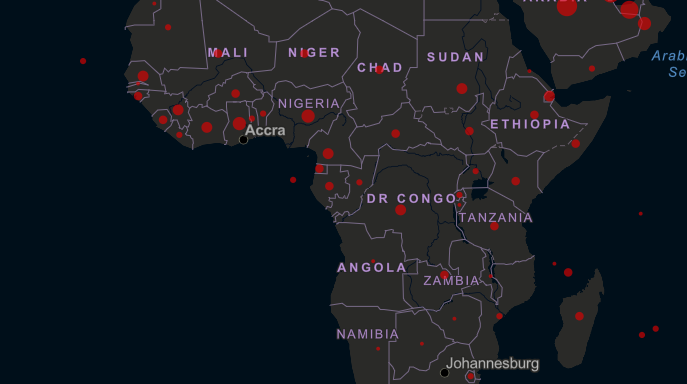Home Economy The Covid-19 (coronavirus) pandemic is leading sub-Saharan Africa into its first recession in 25 years
Growth in sub-Saharan Africa has been severely affected by the coronavirus pandemic and is expected to shrink sharply between 2019 and 2020, from 2.4 percent to -5.1 percent, plunging the region into its first recession in more than 25 years, according to the latest edition of Africa’s Pulse, the World Bank’s biannual report on Africa’s economic situation.
“The Covid-19 pandemic is challenging the limits of the world’ s companies and economies, and is likely to deal a particularly severe blow to African countries,” says Hafez Ghanem, World Bank Vice President for Africa. “We are raising maximum resources to help countries meet the immediate and life-saving medical needs of their people. That is why we are calling on official bilateral creditors for a debt service moratorium that would free up much-needed cash to strengthen health services to deal with COVID-19 and save lives, fund social safety nets to preserve livelihoods, help workers who have lost their jobs, support small and medium enterprises, and ensure food security.”
The report’s authors recommend that African policymakers focus their strategy on the goal of saving lives and protecting livelihoods, with a focus on strengthening health systems and responding quickly to minimize disruptions in food supply chains. They also call for the deployment of social protection programs, including cash transfers, food distributions, and fee waivers, to assist households and, in particular, informal sector workers.
The analysis estimates the production losses associated with the Covid-19 pandemic to be between $37 and $79 billion in 2020, due to a combination of several factors: disruption of trade and value chains, which affects commodity exporters and countries that are highly integrated into global value chains; reduction of foreign financial flows (migrant remittances, tourism receipts, foreign direct investment, foreign aid) and capital flight; direct impact of the pandemic on health systems; and disruptions due to lockdown measures and population response.
While most African countries are affected to varying degrees by the pandemic, real gross domestic product growth is expected to slow sharply in particular in the three largest economies in the region (Nigeria, Angola, and South Africa) against a backdrop of continued weak growth and investment. In general, oil-exporting countries will be most affected, while growth is expected to slow sharply in the region’s two most dynamic areas-the Economic and Monetary Union of West Africa and the East African Community-because of sluggish external demand, disruption of supply chains, and disruption of domestic production. Tourism activity is expected to pay a high price for the severe disruptions in the travel sector.
Covid-19 crisis is also likely to cause a food crisis in Africa, with a contraction in agricultural production of between 2.6 percent in the optimistic scenario but up to 7 percent in the event of trade blockages. Food imports will also decline sharply (by 13 to 25%), driven by higher transaction costs and declining domestic demand.
Several African countries have responded quickly and decisively to halt the emergence and spread of the coronavirus, largely following international guidelines. However, the report highlights several factors that may hinder the lockdown and mitigation measures that have been put in place, particularly overcrowding in informal urban neighborhoods, lack of access to water and sanitation, and weak health systems. The magnitude of the impact will ultimately depend on the response of the population, the spread of the disease, and the government’s response. Together, these factors are likely to lead to lower labor force participation, underutilization of capital, less accumulation of human capital, and lasting consequences on productivity levels.
“Faced with the Covid-19 pandemic, countries are not only taking containment measures, but are also deploying an arsenal of emergency fiscal and monetary measures, with many central banks in the region making important decisions, including lowering interest rates or injecting unprecedented levels of liquidity into the economy,” says Albert Zeufack, the World Bank’s Chief Economist for Africa. “But we need to ensure that the fiscal response incorporates social protection interventions, especially for informal sector workers, and sows the seeds for making our economies more resilient.”
Authors stress the need for an appropriate policy response that reflects the structure of African economies (including the large size of the informal sector) and the specific constraints currently facing policymakers, in particular reduced fiscal space, increased risks of debt distress, and the overall lack of operational capacity to respond to the crisis.
“Immediate measures are important, but only debt relief will provide the resources needed to fight the pandemic and preserve the region’s macroeconomic stability,” said Cesar Calderon, Senior Economist at the World Bank and lead author of the report.”
Due to the Covid-19 pandemic, national and regional economic conditions are highly fluctuating and subject to daily changes. The analysis presented in the report is based on the latest national data available as of the first week of March 2020.
The World Bank Group is taking rapid and far-reaching action to help developing countries strengthen their response to the pandemic and improve health surveillance and public health interventions, while supporting the private sector to enable businesses to continue operations and maintain jobs. It plans to provide up to $160 billion in financing over the next 15 months to help countries protect poor and vulnerable populations, support businesses, and foster economic recovery.
PRESS RELEASEN : 2020/099/AFR
Contacts
Washington
AbyToure
Image: https://coronavirus.jhu.edu/map.html

